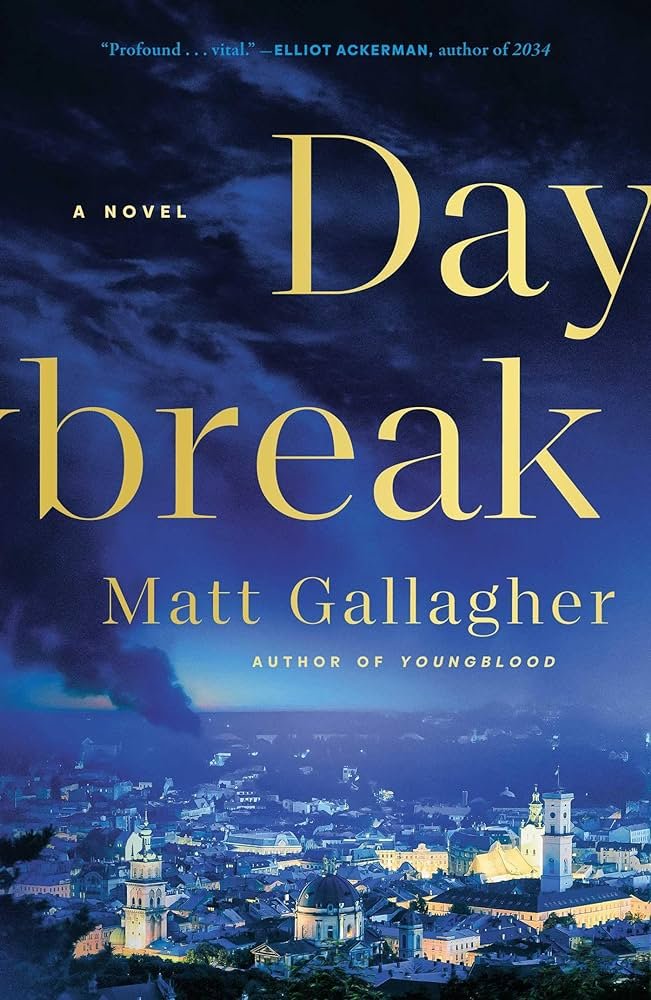Daybreak
by Matt Gallagher
February 2024
An extract from Daybreak, the brand new novel by Matt Gallagher.
The bus pitched east through midnight black and Luke Paxton sat with his head against the window, alone with his thoughts. Winter clawed at him through the glass but he kept himself nestled against it. He found the tinges of outside cold bracing, and wanted to keep awake. He wet his throat and stared out at the flurries of snow dusting the road. Dark, baleful forest lay beyond. A convoy of supply Humvees crested a small hill, pushing the other way, toward the border. Something sharp and hot swelled in Pax’s chest. Haven’t felt like this in a long time, he thought. It was thrill. It was fear. More than anything, Pax felt like someone again.
They’d crossed an hour before. First had come potholes, then bunkers and checkpoints with barrels of fire licking the night. The checkpoints were for show, performative, barely better than nothing and maybe not even that. Men with flashlights and slung hunting rifles, a gesture at presence for the sake of itself. What they need, Pax thought, is razor wire. Some Hesco barriers, staggered to force vehicles into a funnel. A machine gun on overwatch ready to snuff out any runaways and squirters. The basics.
They’ll learn, he thought. It’s all new here.
The bus slowed over an old bridge, reaching a village. Brittle Ukrainian sounded through a loudspeaker, reminding of the national blackout. At a bend a tiny church glowed dim, a mural of Jesus holding a candle charting through the snow. Pax blinked and blinked but the image stayed with him long after they left. He hadn’t believed for many years but still wanted to be a person who could.
Across the aisle, Lee was draped over his assault pack, snoring away with the clean conscience of a man who knows his place in the world. Pax had dressed to blend in, jeans, a simple black jacket. Lee wore a hoodie with a skull superimposed in front of crossed rifles, the word “INFIDEL” screaming above the logo. He’d raised the sleeves to his elbows to show off his tattoos of flames and razor wire and old unit crests. A nametape and subdued American flag patched across his assault pack, completing the look. When Pax had teased him about it at the airport, Lee had dug in: “I’ll be the only Asian around for a fucking thousand miles. People need to know they’re dealing with a killer.”
He wasn’t, though, that was the whole thing. Lee’s kill had eluded him through all his deployments, always seconds late to the firefight, a hesitant lieutenant at his shoulder, or a vexing, oblivious civilian standing between him and his chosen glory. It was just luck, happenstance, like so much else in combat, but Lee hadn’t been able to shake the sense of lost purpose in the homeland so now he was here, to again carry the gun.
“We gotta be there, man,” Lee had said when he’d reached out over the phone, trying to find a travel partner as crazy or bored as he was. “They need people like us.”
They? Us? Open questions. Pax had said yes since no one else would, he’d heard it in Lee’s voice, something between despair and disgust, and because he’d had no reply for Lee’s next line, delivered with all the subtlety of an ice pick: “What else you got going on?”
Pax had another reason for coming, too, one all his own, one that had little to do with this strange new war. He guarded this secret, protected it, had it buried deep in a notebook in the backpack between his feet. It’d been given to him ten years before and he’d held on to it ever since. A lifetime ago, he thought. When I’d been worthy of it. When I’d been worthy of her. The feeling in his chest swelled again. He tried to keep it there. It faded away.
From the rear of the bus, laughter crackled like burning wood. It was followed by amused hushes, which in turn yielded more laughter. Pax knew its source: young Ukrainian men returning from abroad to join the fight. Lee had chatted up the ones who knew English while they’d driven through the outskirts of Krakow, and learned they were a collection of students and IT workers living in the Nordic states. None had a day of military training. The leader, a tall blond kid with high cheekbones, hadn’t liked it when Pax interjected to ask what they thought they could contribute.
“This is our country” was all he’d said. He’d said it coiled, with hostility. Pax hadn’t meant anything with his question. He’d just wanted to know.
He turned and looked at the group. They were sharing a flask, all coltish energy and banter, trying to conceal whatever was going on inside them with noise. Which is what young people facing the prospect of battle must do. It was the way of things. This was not the time for much thinking.
I’m walking proof, Pax thought, smirking. I know just when to turn off my brain and ignore that I’m washed-up and broken. Pax was thirty-three. He’d been out of the army for more than a half decade. He didn’t actually believe he was washed-up. He was less sure about the broken part. His snoring friend was thirty-nine and had quit a job as shift supervisor at a regional electronics retailer in Southern California to come here. They weren’t near as close to Corporal Luke Paxton and Staff Sergeant Han Lee of the 173rd Airborne, U.S. Army infantry, as they’d needed to pretend they were to get this far, to be on this bus, rumbling into an alien unknown. Stopping to consider that, or anything at all, would’ve paralyzed them.
Pax took a slow yoga breath and rubbed at the prayer beads wrapped around his wrist. A lady at the VA had suggested these habits to him, once upon a time, and they worked, not always, but enough. His attention pushed out the window again but there was nothing there for him now, only the void of passing night.
“Sleep. Drink. Watch the dark. These are the options.”
Pax followed the rasping words across the aisle. Two rows in front of Lee’s slumbering form, a woman leaned over the back of her seat, elbows out, angled toward him. She wore an olive puffer jacket and had pulled her mousy brown hair back into a ponytail, a wave of stress lines running the horizon of her forehead. A shining blue eye the shade of a robin’s egg severed the space between. Under the dim lighting of the bus, he could just make out the drooping eyelid that fell over its twin. Pax had taken stock of her earlier. She’d been, and remained, the only woman on the bus.
“And talk,” Pax said, sliding over to the aisle seat of his row. “That’s another option.”
“American,” the woman said. “Most of your people are going the other way.”
Pax smiled. Doing something different pleased him. “For what are we born if not to aid one another?” he said, repeating a line Lee had posted to Facebook that had earned many likes.
In contrast to the young men, the woman’s English was precise, confident. She’d lived in Ohio for a year, she explained, during her studies. Between that divide and a mention of children, Pax allowed himself to relax into the conversation. She’s not beautiful, he thought, watching her good eye shine. Not that he could judge much on the matter. He knew he wasn’t handsome. Time had given him the face he deserved. Though the rules weren’t the same for women and men. It’s not fair, he thought. But what is?
“Where are your kids now?” he asked.
“They will stay in Poland with my sister until the war’s over.” The woman sighed, then corrected herself. “Until the victory.”
“Why—” Pax hesitated. It was a tricky question, he knew. But martial law demanded only Ukrainian men stay in-country. “I mean, if you’re okay sharing. I’m just a guy on a bus.”
“It is my duty,” she said. “I’m a military officer.”
“Of course,” Pax said, hoping he’d masked his surprise, knowing he hadn’t. He asked what type.
“NATO countries call it civil affairs. I’ll be back east in a couple days. My commander gave me leave to escort my sons to the border. We live near Kyiv, and we knew they’d strike there. They need the river . . .” She trailed off.
Pax asked the name of her hometown. A place called Bucha, she said. Nothing special. Just a quiet suburb.
“I was in the army, too,” he said. She nodded as if she’d known that all along. “Can I ask why you joined?”
She laughed. It was the ironic laughter of reluctant soldiers everywhere. “To change the world,” she said. Then her voice turned sincere. “It was Maidan. It was the only important thing which happened to us. It showed ordinary people can fight the big strongmen and win. I was too young for the barricades but my brothers and their friends went. They were my heroes. When they came home to rest I’d pour them tea and sneak them my father’s beers and listen to what they’d done and seen that day. Their table stories were like magic to me.” She shrugged through the dark of the bus. “Besides, my father swears we’re descended from Cossacks. Probably not true but families need their little lies.”
Maidan. Strongmen. Cossacks. Pax was familiar with these things in a hazy, malleable way, but didn’t want to betray the vastness of his ignorance. None of it was why he’d come. The officer saved him from any of that by returning his question: Why had he once enlisted?
“Wish I could remember, fuck,” he said, then, “Apologies,” because he’d been trying to curse less. His boss at AutoHut had told him it was unprofessional, low-class, that the real world wasn’t like the army, and while Pax had resented him for it, the criticism lingered. The Ukrainian didn’t seem to mind, at least. She didn’t even blink.
“Wasn’t patriotism or anything,” he continued, rubbing the stubble around his chin. “More like, a way to do something. I grew up in a small town, middle of nowhere. Biggest, nicest buildings were the Methodist church and the National Guard armory.” He paused, remembering. “Still think about that, sometimes.”
“And why are you here?”
Something seemed to curdle in the recycled air of the bus, and the woman’s good eye fixed on him like a shaft of light, the bad one falling away into the shadows. There was a directness to her rasping voice now, a sense of inquiry beyond the scope of conversation. Should I say that I’m looking for someone? No, he decided. Even through the duloxetine, Pax heard silent bells of caution.
“Wish I could remember that, too” was all he said.
He stretched back in his seat, as if to get farther away from the officer. From the corner of his eye, he saw Lee awake, watching them both with a glancing stare.
Extracted from Daybreak by Matt Gallagher. Published by Atria Books. Out now.


